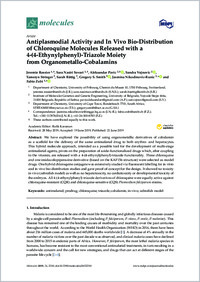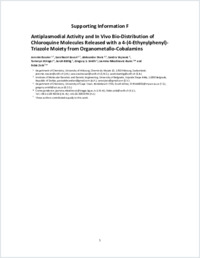Antiplasmodial activity and in vivo bio-distribution of chloroquine molecules released with a 4-(4-ethynylphenyl)-triazole moiety from organometallo-cobalamins
- Rossier, Jeremie Department of Chemistry, University of Fribourg, Switzerland
- Sovari, Sara Nasiri Department of Chemistry, University of Fribourg, Switzerland
- Pavic, Aleksandar Institute of Molecular Genetics and Genetic Engineering, University of Belgrade, Republic of Serbia
- Vojnovic, Sandra Institute of Molecular Genetics and Genetic Engineering, University of Belgrade, Republic of Serbia
- Stringer, Tameryn Department of Chemistry, University of Cape Town, Rondebosch, South Africa
- Bättig, Sarah Department of Chemistry, University of Fribourg, Switzerland
- Smith, Gregory S. Department of Chemistry, University of Cape Town, Rondebosch, South Africa
- Nikodinovic-Runic, Jasmina Institute of Molecular Genetics and Genetic Engineering, University of Belgrade, Republic of Serbia
- Zobi, Fabio Department of Chemistry, University of Fribourg, Switzerland
-
21.06.2019
Published in:
- Molecules. - 2019, vol. 24, no. 12, p. 2310
English
We have explored the possibility of using organometallic derivatives of cobalamin as a scaffold for the delivery of the same antimalarial drug to both erythro- and hepatocytes. This hybrid molecule approach, intended as a possible tool for the development of multi-stage antimalarial agents, pivots on the preparation of azide- functionalized drugs which, after coupling to the vitamin, are released with a 4-(4- ethynylphenyl)-triazole functionality. Three chloroquine and one imidazolopiperazine derivative (based on the KAF156 structure) were selected as model drugs. One hybrid chloroquine conjugate was extensively studied via fluorescent labelling for in vitro and in vivo bio-distribution studies and gave proof-of-concept for the design. It showed no toxicity in vivo (zebrafish model) as well as no hepatotoxicity, no cardiotoxicity or developmental toxicity of the embryos. All 4-(4-ethynylphenyl)-triazole derivatives of chloroquine were equally active against chloroquine-resistant (CQR) and chloroquine- sensitive (CQS) Plasmodium falciparum strains.
- Faculty
- Faculté des sciences et de médecine
- Department
- Département de Chimie
- Language
-
- English
- Classification
- Chemistry
- License
- License undefined
- Identifiers
-
- RERO DOC 326964
- DOI 10.3390/molecules24122310
- Persistent URL
- https://folia.unifr.ch/unifr/documents/308086
Other files
Statistics
Document views: 67
File downloads:
- zob_aav.pdf: 109
- zob_aav_sm.pdf: 90

